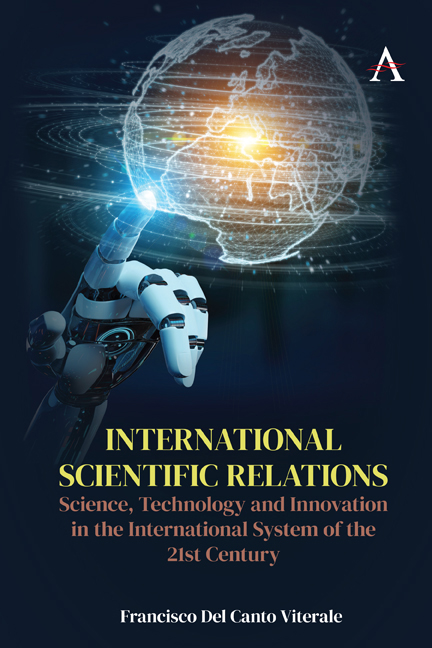 International Scientific Relations
International Scientific Relations 6 - Emerging Realities
Published online by Cambridge University Press: 08 October 2021
Summary
The systemic study carried out up to this point on ISR (Part 2: Analytical Framework) has allowed us to discover and examine the global international context (Chapter 2), to identify the main international actors taking place in its dynamic (Chapter 3), to recognize the different interactions established between them (Chapter 4) and, finally, to discover the operative processes and mechanisms that develop within them (Chapter 5).
As a result of this analysis, in this chapter, it will be possible to identify and analyze some emerging realities that have arisen precisely as a result of the links established between the context, the actors, the relations, and the processes within ISR. These emerging phenomena become distinctive characteristics of ISR, with a great impact on the entire international system.
ISR is understood in this research as a system of interrelated actors and, as far as some of their main characteristics are mere results of the property of its members (the so-called hereditary or resulting properties), some derive from the relations among the actors, but without the actors possessing them themselves (the so-called emerging or collective properties). The interactions between actors in the field of ISR produce emerging patterns of conduct that, even though no one has planned, wished for, or sought them out, proliferate as global characteristics and become trends and macrotrends that feed back to the rest of the international system.
For this reason, in this chapter, it will be important to identify, characterize, and explain which most relevant emerging realities are stemming from the study on ISR and to discern the possible consequences they might have for the new world order.
New Emerging Phenomena
Through the extensive study of the systemic parameters of ISR, it has been possible to distinguish some emerging realities. Among them, we can mention the rise of STI diplomacy, the new struggle for global talent, the emergence of international cooperation networks, the development of scientific diasporas, the appearance of new methods of production and forms of intermediation of scientific knowledge, and the emergence of a renewed and intense competitive race between the different international actors to achieve a higher development of their STI systems.
- Type
- Chapter
- Information
- International Scientific RelationsScience, Technology and Innovation in the International System of the 21st Century, pp. 157 - 184Publisher: Anthem PressPrint publication year: 2021


